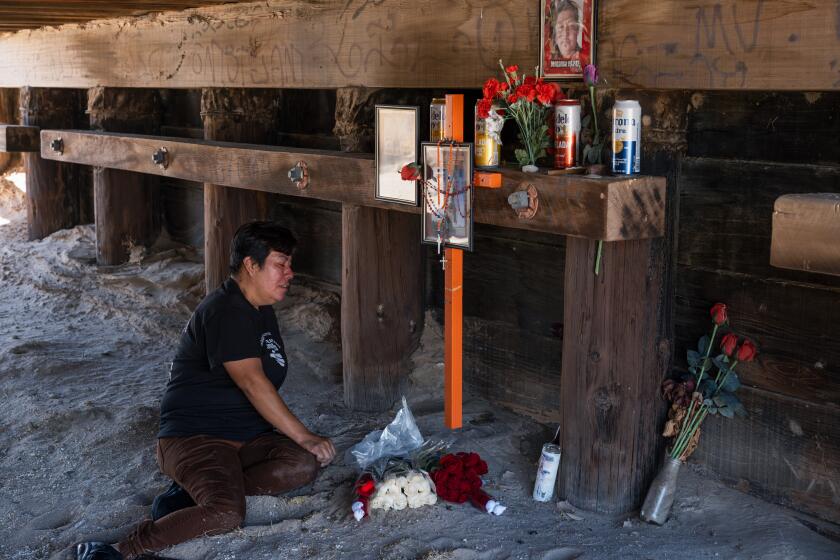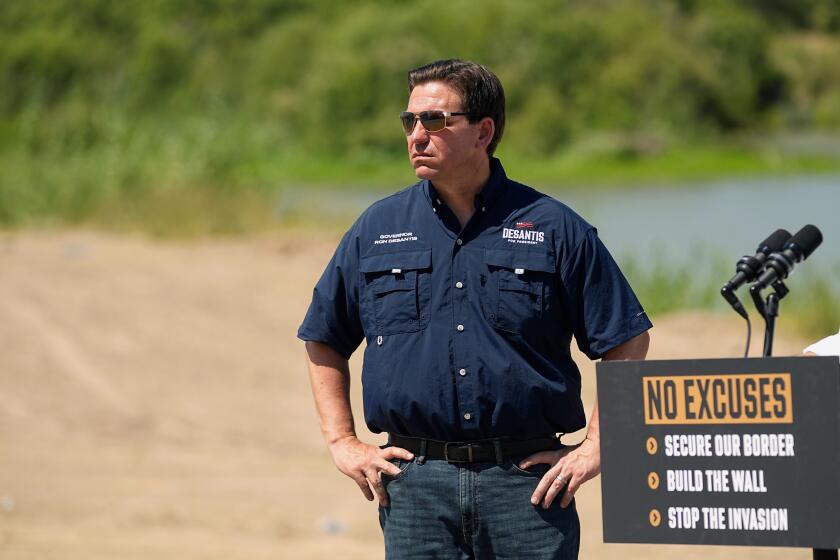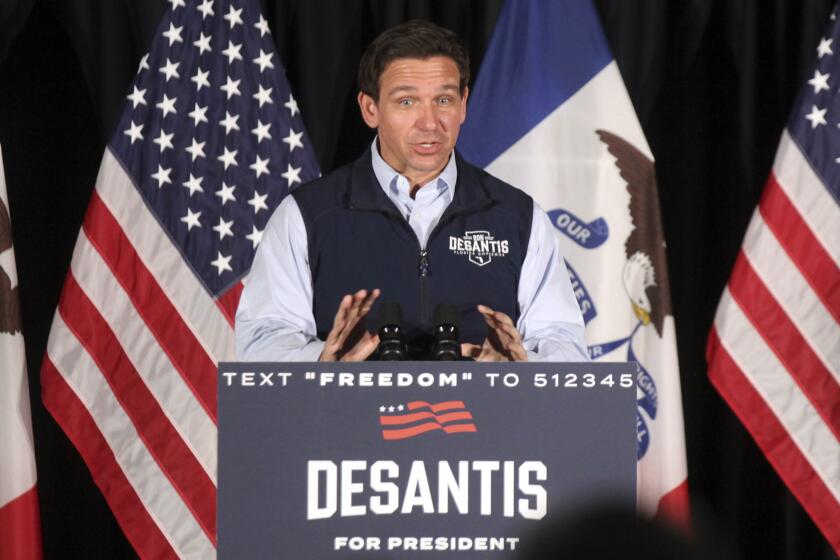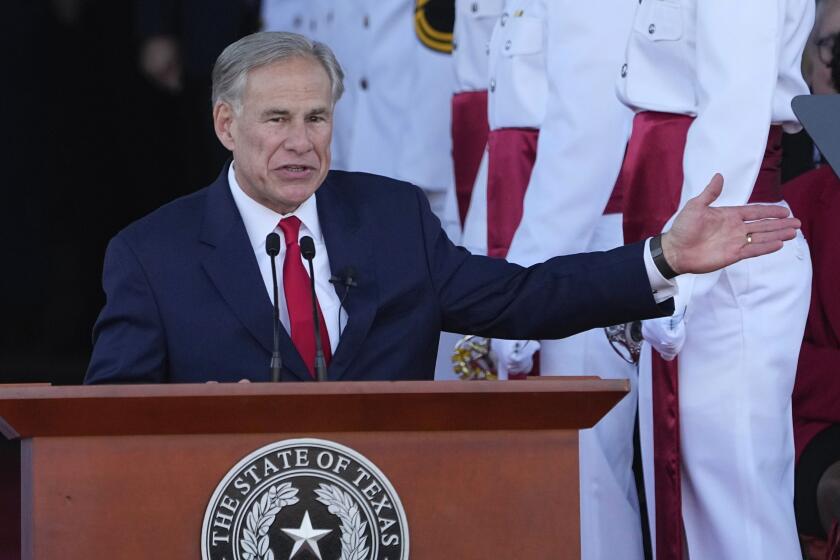Column: Can Texas Gov. Abbott set lethal border barriers and still win Latino votes?

- Share via
Republican Texas Gov. Greg Abbott’s man-made killing traps on the Rio Grande have taken border enforcement to new levels of barbarity.
Since border militarization began in the 1990s, anti-immigrant hardliners could deflect blame for hundreds of yearly deaths at the U.S.-Mexico border, pointing to natural dangers in the region’s deserts and rivers. Now, as bodies are discovered around saw-equipped buoy barriers and barbed wire water traps of Operation Lone Star, the illusion of innocence has been blown away.
Opinion Columnist
Jean Guerrero
Jean Guerrero is the author, most recently, of “Hatemonger: Stephen Miller, Donald Trump and the White Nationalist Agenda.”
Could Abbott face a backlash among Texas Latino voters, as Republican Gov. Pete Wilson faced three decades ago with California Latinos for his vicious attacks on immigrants? Some of Abbott’s supporters are souring on his recent enforcement actions. One Abbott supporter with property on the Rio Grande, Magali Urbina, told the Texas Tribune this month that she was deeply disturbed to see a pregnant woman push through concertina wire in the water, her arms cut and bloodied.
Rep. Joaquin Castro (D-Texas), who met with Urbina and other residents about their concerns, told me that many Texans who want strong border security are upset about the cruelty. “There’s a difference between immigration enforcement and treating people like animals,” he said.
To return to the U.S., he tried to cross the desert in Imperial County.
Last month, Abbott’s flesh-piercing floating barriers prompted a lawsuit by the Justice Department. State authorities have claimed a body caught in the buoys drowned upstream and floated there. Earlier this month, a 3-year-old girl died in a Texas-backed bus ride to Chicago, raising more questions.
Despite the outrage, it’s not clear that Abbott will lose substantial ground with Latino voters. The Latino population in Texas is more conservative than California’s. Lone Star State Latinos are more likely to own homes and less likely to be foreign-born than Golden State Latinos. With regional roots dating as far back as the 1500s, Texans of Latino ancestry will often identify as Tejano above all. They are less likely to see themselves in immigrants.
No politician would suggest bombing U.S. corporations behind opioid-related deaths, but all top GOP presidential contenders endorse a counterterrorism operation against cartels in Mexico.
While a majority of Texas Latinos reject Abbott, the consistent two-fifths who support him have helped him win three gubernatorial elections, including last year’s when he was already an agent of chaos on the border.
And although Texas border security spending shot up astronomically under Abbott, a June 2023 poll by the University of Texas at Austin’s Texas Politics Project shows 36% of Latino respondents believe the state is spending too little on border security. The share of Latino respondents who said border security is the most important issue facing Texas (13%) was greater than those who cited inflation (11%), the economy (6%) or abortion (5%) as the top issue. The only issue that got more votes was gun control and gun violence (15%).
Half of the surveyed Latinos supported deploying additional state police and military resources to the border. Meanwhile, 90% of Republican-leaning Texans supported the same. “This is a great issue for Republicans because it unifies Republicans and to some degree, it splits Democrats,” James Henson, the project’s director, told me. “The governor is also aware that Latinos are split in ways that are comparable to the ways that Democrats are split.”
The former president’s pledge to end birthright citizenship is a new low, but it is unlikely to be the end.
Texas Latinos are divided on legal immigration, as well: 47% of surveyed Latinos said there’s too much of it, compared with 54% of surveyed whites who said the same. “I don’t think Latino public opinion is driving the policies for Abbott, but they don’t assume Latino opposition,” Henson said.
The border occupies outsize space in the psyches of all Texans, including Tejanos, because of its sheer length on the state’s southern edge: 1,254 miles, more than half of the total miles of the U.S.-Mexico border. Fearmongering about immigration on Fox News and other right-wing media is more likely to create anxiety among people in a state with so much physical exposure to it, regardless of whether they have firsthand experience with its issues.
As a result, Tejanos aren’t overwhelmingly against Abbott’s crackdown. His Latino support is strongest among men, a trend that holds true nationwide. His macho posturing on the border works. “There is this strong law-and-order vibe that Latinos in the area seem to be attracted to,” Roberto F. Carlos, assistant professor of government at the University of Texas at Austin, told me.
In South Texas, where the GOP has made limited inroads in recent years, Latinos are more likely to live in rural areas and to embrace conservative values related to religion and family. Many have a hard time buying into the idea of systemic racism. “People in the [Rio Grande] Valley look around and ask, who’s in power here?” Alvaro Corral, assistant professor of political science at the University of Texas Rio Grande Valley, told me. “A lot of Latinos. Who are the members of Congress? Who are our mayors? Who’s on the City Council? All Latinos.”
He has championed guns and gutted mental health care. How can he still claim that access to such care is the key to preventing mass shootings?
Along the southern border, Latinos are often employed by Border Patrol and other law enforcement agencies. Even those who identify as Democratic are a far cry from California’s liberals. For example, Rep. Henry Cuellar, whose district runs from the Rio Grande to San Antonio, is the most conservative Democrat in Congress.
But at the end of the day, the audience for Abbott’s border brutality aren’t Latinos. Although Latinos are now the largest demographic in Texas, they’re underrepresented in the electorate because of gerrymandering and other barriers to voting such as discriminatory voter ID laws, as well as the fact that the group skews young.
His cruelty isn’t even about Texas. Abbott is using the border as a stage to grab the attention of all Americans. “He’s cultivating a national brand and persona that gives you all of the policies vis-a-vis immigration that Donald Trump would give you, but with the lack of baggage,” Corral said.
Unlike Florida Gov. Ron DeSantis, Abbott isn’t facing a term limit. He can wait for his moment to run for president. In the meantime, he’ll keep chasing celebrity and power on the backs and bodies of immigrants.
More to Read
A cure for the common opinion
Get thought-provoking perspectives with our weekly newsletter.
You may occasionally receive promotional content from the Los Angeles Times.
















